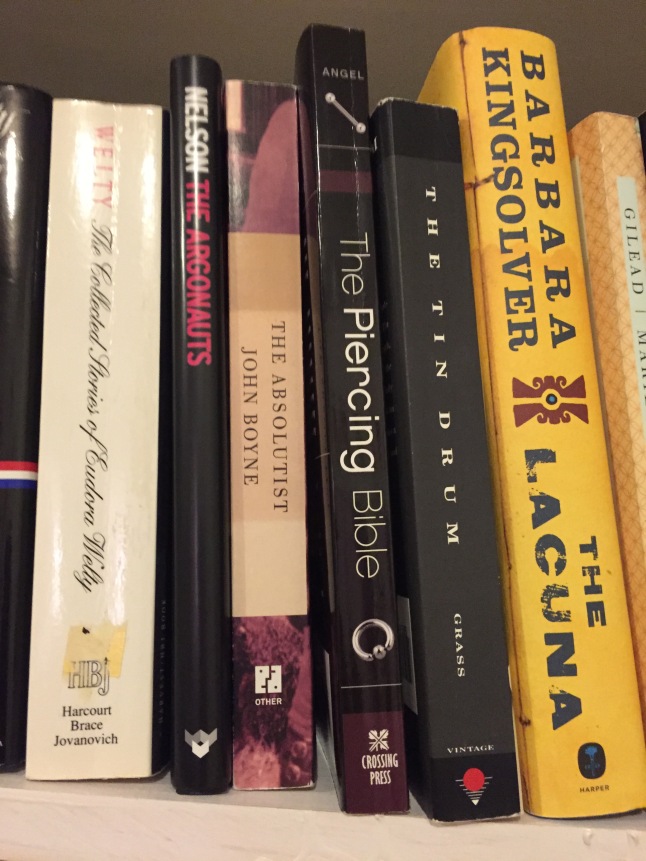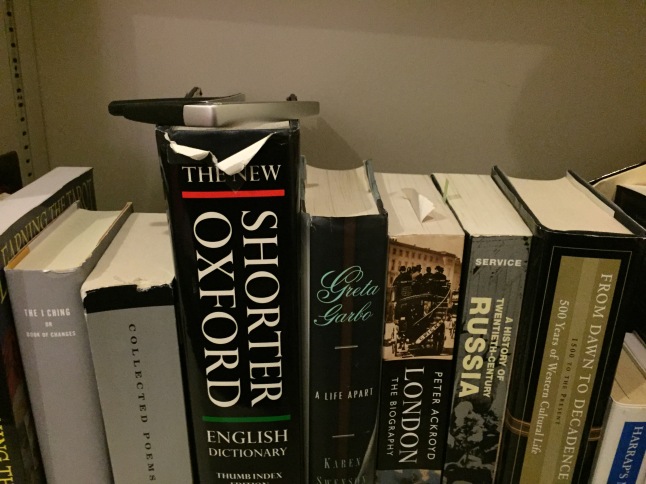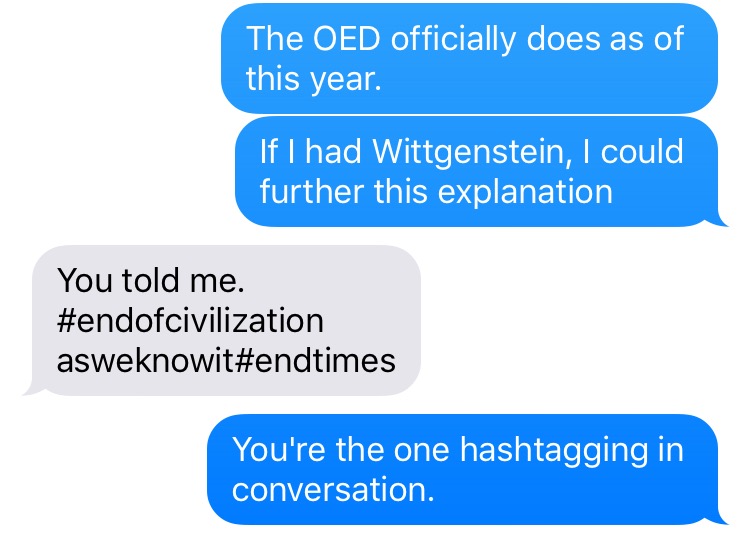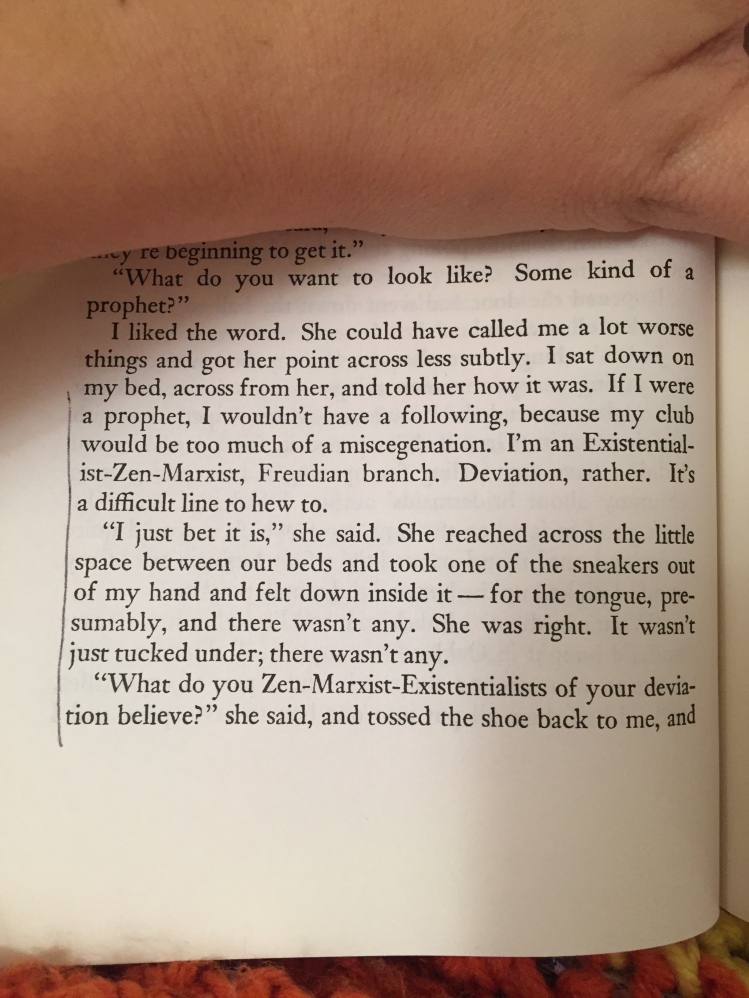I was trying to think of other places I spend a lot of time, and I realized that my floor is one of them. Maybe that needs clarification. I have physical therapy exercises, and I spend considerable time in the middle of the floor, stretching gracelessly. I have two view options: the ceiling and the bookcase. You can guess which one I choose.
In an ideal world, all my books are present and in some sort of order. Presently, I have a small number of them, and they’re shelved where they landed. This has produced some literary oddities, which are discussed below. If you make it to the end, there’s some reflection on becoming numb/attuned to your everyday environment.
Also below, in color: topics for discussion! I’d love to hear your opinions. Leave them wherever you wish, but do note that you can comment on WordPress even if you don’t have an account; just pick a name, any name, and that’s all there is to it.

View #1

View #2 (no, I don’t know what the box-and-cord thing is)

The Snopes family wuz here
Faulkner looks messy. This is because I looted my selection of novels when I tried to write something else (not going well). In spite of the number of duplicates shown here (a further duplicate of Light in August is among the missing), I assure you there’s “logic”: I keep books that have significant underlining and/or notes, and Faulkner has gotten spread out over the years.
I’ll generally loan any book; it’s only the ones that have what I consider personal (personally inspired?) commentary that I’m not really fond of letting people borrow. I don’t want to lose them, and, often, the notes are a sort of journal for whatever was going through my head at the time I read something. Some books are palimpsests with multiple colors of ink from different times, comments in reply to my own comments: these are the books I like to keep close to home.
Do you have any oddities about loaning books, any books you prefer not to loan?

I feel that all involved would be affronted, but I apologize only to Wolfe.
The current disarray has produced some really inexplicable shelving situations: above, see Wolfe-Salinger-anonymous-Capote. I can’t decide if the tarot deck lounging on the Salinger is rakish or appropriate. I sort of think he would have preferred something more hoity-toity: maybe the I Ching. And I’m pretty sure J.D. is uncomfortable there between Wolfe and Capote: a person of few words between two Southerners who go on . . . and on . . . and on . . . . Maybe I’m okay with this arrangement, after all.
What writers would you like to get together? I don’t mean that as one of those nice grouping things for enlightening chat. I mean who do you think would get in a knock-down drag-out?

Neil Gaiman is cordially not invited to come hang out.
This is where I admit to being (apparently) the only human on earth who doesn’t like Neil Gaiman: that’s my entire “collection,” right there. I read it every time someone/some group predicts an impending apocalypse (really). As you can see by the state of the binding, that’s more often than you might think. Gaddis is there to squash him if he talks too much and starts to annoy me.
The thin almost-zine-looking books are by Ali Liebegott (you may have seen her on Transparent, and she’s written for that– plus some excellent novels). Find them here. They’re excellent.
Back to topic: does anyone else have any offbeat reading traditions?

Yes, I’m elitist about the cover thing.
This is a gratuitous photo of the (very few) Patricia Highsmith books I have, including The Price of Salt— which I read WAY before Carol (which has not come anywhere near here; some Star-something movie just opened instead). I’m an elitist about not having the movie cover, so this pleases me. As I said: gratuitous.
Ripley creeps me out. Is that just me? Does anyone have any further Highsmith suggestions? That’s really about the only one I like.

Pulpy!
The reason I have that particular Highsmith is an affinity for pulp of that era. Of course, in the current disarranged state of the shelves, none of it is together. Ann Bannon is off by herself, separate from all the various other books, and those aren’t even in series order. I should be ashamed. I’m kind of getting twitchy as I write this, if that counts.
Really twitchy. But I’d be interested to hear (comments!) how you sort your books.

Your guess is as good as mine.
Please use the comments to theorize what the heck is going on here. I certainly don’t know.

twitch-twitch-twitch
Did I mention how maddening it is not to have all my books here? Witness 1/2 the Shorter OED (capo was not included with set). Some relevant things about that dictionary:
- the set was my high school graduation present, and thus
- it has traveled everywhere with me from college on.
- It was the last edition not to list “fun” as an adjective. I’ll never upgrade.
- Seriously. I refer to the DFW book A Supposedly XXX Thing I’ll Never Do Again as “the orange paperback” or “the one with the cruise essay.” I’m not reactionary. Or obscurantist.
Is there any particular book you drag around with you– through move after move– come hell or high water? Bonus points if it’s a pain in the butt to transport.

Youth!
In fact, please see the Kerouac accumulation as evidence that I was young once.
Wait. Why is Jan mixed in with Jack? Argh. And I’m pretty sure I have Baby Driver somewhere.
Do you have any (book) Relics of Your Youth that you’re still hanging on to?

This is a ~*~decorating tip~*~.
If you have books that are too heavy for your shelves– Riverside Shakespeare, Proust– a lintel is a good place for them. If you have to murder an unsuspecting guest with a heavy object, it could be made to look like an accident.
Coroner’s verdict (pick one): Death by Shakespeare/In Search of Lost Time/The Lord of the Rings.
I will not ask you if you have any just-in-case homicide plans involving household objects.
The (Quasi-) Thoughtful Part
So there’s the latest field notes. Everything gets a little weirder when you stare at it for a very . . . long . . . time (repeatedly). The book lack/mess wasn’t so much at the forefront of my mind until I had to stare it in the face so frequently. Moral of the story: you can dig up a lot of conversational topics from something very, very mundane if you have time to think about whatever it is. The ordinary isn’t necessarily unworthy of talk, and you don’t always have to go have a grand adventure to have something to talk about.
It’s also amazing how much you can tune out something you see every day and become effectively numb to how much is going on there.
I’m going to corrupt a term completely here: zazen. For purposes of this post, though: how often have you just taken the time to sit and regard your own everyday environment? What does it say about you? What’s comfortable about it? What do you like and dislike? What could you change?
I would very much be interested to hear answers to any of the above questions, bookish or otherwise.

















